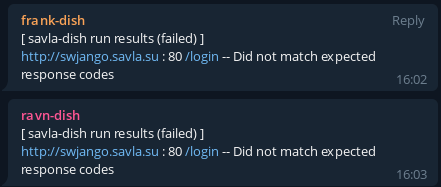- tiny one-shot monitoring service
- remote configuration of independent 'dish network' (via
-source ${REMOTE_JSON_API_URL}flag) - fast parallel testing, low overall execution time, 10-sec timeout per socket by default
$ go install go.vxn.dev/dish@v1.6.1
$ dish -h
Usage of ./dish:
-hname string
a string, custom additional header name
-hvalue string
a string, custom additional header value
-name string
a string, dish instance name (default "generic-dish")
-pushgw
a bool, enable reporter module to post dish results to pushgateway
-source string
a string, path to/URL JSON socket list (default "demo_sockets.json")
-target string
a string, result update path/URL, plaintext/byte output
-telegram
a bool, Telegram provider usage toggle
-telegramBotToken string
a string, Telegram bot private token
-telegramChatID string
a string/signet int, Telegram chat/channel ID
-timeout int
an int, timeout in seconds for http and tcp calls (default 10)
-update
a bool, switch for socket's last state batch upload to the source swis-api instance
-updateURL string
a string, URL of the source swis-api instance
-verbose
a bool, console stdout logging toggle (default true)The idea of a tiny one-shot service comes with the need for a quick monitoring service implementation to test HTTP/S and generic TCP endpoints (or just sockets in general = hosts and their ports).
The list of sockets can be provided via a local JSON-formated file (e.g. demo_sockets.json file in the CWD), or via a remote REST/RESTful JSON API.
# local JSON file
dish -source=/opt/dish/sockets.json
# remote JSON API source
dish -source=http://restapi.example.com/dish/sockets/:instanceWhen a socket test fails, it's always good to be notified. For this purpose, dish provides three different ways of doing so (can be combined):
- test results upload to a remote JSON API (via
-updateURLflag) - failed sockets list as the Telegram message body (via Telegram-related flags, see the help output above)
- failed count and last test timestamp update to Pushgateway for Prometheus (via
-pushgwand-targetflags)
(The screenshot above shows the Telegram alerting as of v1.5.0.)
One way to run dish is to build and install a binary executable.
# Fetch and install the specific version
go install go.vxn.dev/dish@v1.6.1
# Load sockets from sockets.json file, and use Telegram
# provider for alerting
dish -source sockets.json -telegram -telegramChatID "-123456789" \
-telegramBotToken "123:AAAbcD_ef"
# Use remote JSON API service as socket source, and push
# the results to Pushgateway
dish -source https://api.example.com/dish/sockets -pushgw \
-target https://pushgw.example.com/# Copy, and/or edit dot-env file (optional)
cp .env.example .env
vi .env
# Build a Docker image
make build
# Run
docker run --rm \
dish:1.6.0-go1.22 \
-verbose \
-source https://api.example.com \
-pushgw \
-target https://pushgateway.example.comCreate a bash script to easily deploy dish and update its settings:
vi tiny-dish-run.sh#!/bin/bash
TELEGRAM_TOKEN="123:AAAbcD_ef"
TELEGRAM_CHATID="-123456789"
SOURCE_URL=https://api.example.com/dish/sockets
UPDATE_URL=https://api.example.com/dish/sockets/results
TARGET_URL=https://pushgw.example.com
DISH_TAG=dish:1.6.0-go1.22
INSTANCE_NAME=tiny-dish
SWAPI_TOKEN=AbCd
docker run --rm \
${DISH_TAG} \
-name ${INSTANCE_NAME} \
-source ${SOURCE_URL} \
-hvalue ${SWAPI_TOKEN} \
-hname X-Auth-Token \
-pushgw \
-target ${TARGET_URL} \
-update \
-updateURL ${UPDATE_URL} \
-telegram \
-telegramBotToken ${TELEGRAM_TOKEN} \
-telegramChatID ${TELEGRAM_CHATID} \
-timeout 15 \
-verboseMake it an executable:
chmod +x tiny-dish-run.shcrontab -e# m h dom mon dow command
MAILTO=monitoring@example.com
*/2 * * * * /home/user/tiny-dish-run.sh